|
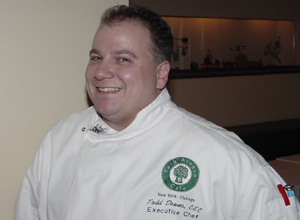 Al: Todd, what I would like you to do is talk to me
about how and why you got into the culinary arts.
Al: Todd, what I would like you to do is talk to me
about how and why you got into the culinary arts.
Todd: Well, I got into it by accident. I was very
artistic as a kid growing up. I worked part-time in high school. I was 15 when
I started at Chaucer's Inn in Fort Wayne. I washed dishes and did odd jobs like
prep work so that I could earn money to buy a car to get around. I noticed that
in the course of my work that the cooks were pretty creative and watched them do
some pretty creative stuff. I started helping them. Somebody called off or got
fired, and I got thrown into the mix. Once I started cooking, they wouldn't let
me go back to washing dishes.
I got into a vocational program in high school,
which was very beneficial to me because it really opened my eyes to the
professional cooking world. It also showed me much more than just what I was
doing at Chaucer's Inn. It also got me hooked up with a Mike Luca who was just
out of culinary school. He was reopening a hotel in Fort Wayne, the Holiday
Inn, which had recently been totally renovated. This was right before I graduated
from high school. Mike he
took me under his wing, showed me all the ropes, and really took an interest in
my development. I learned a lot from him. He had just come from Lake Placid
where he was the chef at the Lake Placid Winter Olympics. He cooked for the
Organizing Committee-a pretty prestigious job. It was an exciting time for me.
He showed me how competition worked and got me into my first one, which I won a
gold medal for a nougat train.
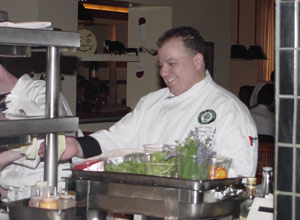 From that point on, I absorbed everything I could
about cooking and food. I didn't have the opportunity to go to culinary school;
I couldn't afford it. I just continued working and fell into another good job
with a really good person, Lois Rothert at a tiny French restaurant in Fort
Wayne called du Jour. She taught me everything from the ground up. I started working in the
cold station doing salads and appetizers, learning how to make pates, things
like that. She had been trained in France. She was instrumental in me doing
things the right way, the classical way. She really laid a good foundation for
me in my future career.
From that point on, I absorbed everything I could
about cooking and food. I didn't have the opportunity to go to culinary school;
I couldn't afford it. I just continued working and fell into another good job
with a really good person, Lois Rothert at a tiny French restaurant in Fort
Wayne called du Jour. She taught me everything from the ground up. I started working in the
cold station doing salads and appetizers, learning how to make pates, things
like that. She had been trained in France. She was instrumental in me doing
things the right way, the classical way. She really laid a good foundation for
me in my future career.
Al: Why is it that we have a tendency to see chefs as
males rather than females?
Todd: I think that's just one of those classic icons
that have been pounded into everybody's head. In history, there have probably
been more famous male chefs than female, and I'd say the percentage of male to
female chefs over history has probably always been 80-20. Lady chefs just
haven't been the dominant theme. I think that they have been there; they just
haven't been as dominant as the male chefs or as visible.
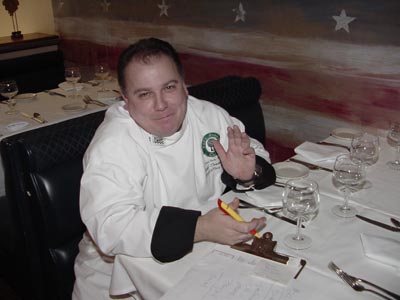 Al: Is there a difference between our nations? Are
the French much more sexist and Americans more liberal?
Al: Is there a difference between our nations? Are
the French much more sexist and Americans more liberal?
Todd: I think Europeans in general probably are, and
that has probably had something to do with it. This is especially true since
most of the chefs that gained any real visibility or notoriety in the U.S.
early on were Europeans. Julia Child was probably one of the first female
chefs to gain any real international acclaim. I think that she did a lot to
further the cause of women chefs in the U.S and the world in general.
Al: How do you account for that? When we think of
food, England isn't the first country we think of.
Todd: I think she had a certain amount of mystique
with the way that she spoke and with her experience overseas. She was down to
earth and made fun of herself. She really helped to demystify
cooking-especially French cooking. She made it do-able for the average person,
and she had the ability to make people laugh and made cooking a lot less scary.
Al: Do you think that she also subconsciously
reminded people of their grandmothers when they were growing up?
Todd: Oh, yes I'm sure there was some of that too.
She had that motherly quality.
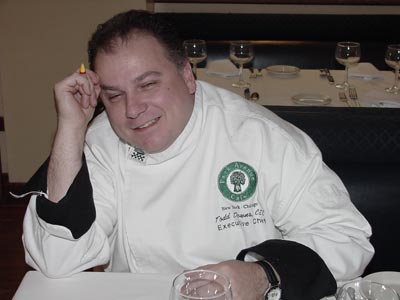 Al: What's it like for your wife to be married to a
chef? Does she cook very often?
Al: What's it like for your wife to be married to a
chef? Does she cook very often?
Todd: She's Hispanic, and she does a lot of family
recipes with which she grew up. She does a lot of breakfast foods
huevos con chorizo, which is scrambled
eggs with chorizo sausage served with tortillas. I think she's intimidated a
little bit, but she's never been excited about cooking. We go out to eat a lot,
just mostly because I'm not in the mood to cook when I'm home and relaxing.
Occasionally, we will have a nice family meal that I've done. However, I'd
rather spend time with the children than slaving behind the stove.
Al: You talked at the beginning of the interview
about creativity. In addition to the being right brain, how to do account for
your cooking creativity? What else is behind your psychological need to create
and cooking?
Todd: I think a lot of it does stem from the fact
that I like to please people. I like to make people happy-to see the look on
their faces when they have eaten a really good meal or hear them say nice things
about something they have had that I have had a hand in. As far as being
creative, I think there is just always this urge to do something once I
encounter food. I start to think about what I can do with it. It's fun for me
just to walk into the coolers to see what we have and then just start drumming
up ideas. It just kind of starts happening. I guess that I have been doing it
for so long that I'm used to just automatically thinking about it.
 Al: If you hadn't been a chef, what do you think you
would have done? Al: If you hadn't been a chef, what do you think you
would have done?
Todd: Probably, I would have pursued some sort of
artistic endeavor, and had I not been able to do that, I probably would have
gotten into architecture, something like that, some sort of design thing. Maybe
I would have gotten into either that or maybe a graphic arts kind of situation.
Al: You are an Executive Chef. What did you have to
do to become one?
Todd: The most direct route is to go to school and
get a degree in culinary arts with further on the job training. Then the most effective way is to pursue some
sort of on the job experience, preferably starting out at the lowest level and
working their way up. The best way to get a handle on all the jobs that are in
your kitchen and really know and understand what your employees go thru, what
they need to do to do the job correctly. It gives you a good perspective on the
whole operation and how to run it. There's a certified body called the American
Culinary Federation, which is the largest organization of cooks and chefs in the
U.S. It certifies culinary arts practitioners all the way up from cook to
master chef. There is a series of things that you need to accomplish in each
area to gain certification for each level. I'm certified as an executive chef
which is the second highest level under master chef and to get that I had to
have five years experience as an executive chef and then pass a test that covers
all areas of cooking from food costs and labor and supervision, sanitation,
and cooking.
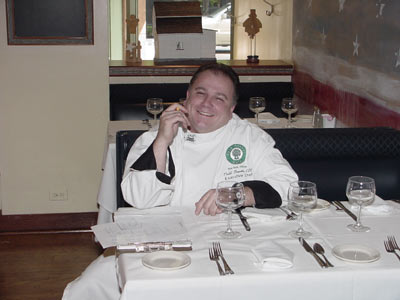 Al: Do you have a list of places where you would like to go to further you education?
Al: Do you have a list of places where you would like to go to further you education?
Todd: I studied in Paris for about a month back in
1985. Lois, the woman I spoke of earlier, coaxed me into going over to Europe.
I had come into some money and rather than blowing it on a stereo system or
whatever, I spent about a month over there traveled around and went to school at
LaVarrene where she had gone. I lived with a person while I there, who has
already been in Paris for six months. He lived on a barge on the Sienne that
was right across from the Louve. When we opened the hatch every morning, we
looked directly at the Louve; it was exciting.
I think if I go back again any time soon, I would
like to go back to Italy and see more of that country, because I really liked
it. I spent several days on the coast down by Portofino, and it was
incredible. I didn't get to eat enough stuff!!
 Al: When you are traveling, can you eat something and
replicate a recipe by merely tasting it?
Al: When you are traveling, can you eat something and
replicate a recipe by merely tasting it?
Todd: It depends on how complex it is. Sometimes
there are things that you don't notice right away, but for the most part, I
can. The great thing about Italy is that the food is very simple, so it is not
very difficult unless there is just a flavor in there that you can't
understand. Sometimes in Europe, they use wild things that you don't see over
in this country. Sometimes some of the fish is a little different from what we
get here, but for the most part, I think I have a pretty good idea of what went
into the recipe.
Al: Would you go back in the kitchen and talk to the
chef at a restaurant that you were visiting?
Todd: Well, I have done that a couple of times.
However, I'm very big about not letting people know that I'm a chef. I don't
want any special attention; I just want to enjoy my meal and my company.
Therefore, I don't unless it is something that is just really, really
incredible, or I can't figure it out. Then I think I need to go talk to the
chef and compliment them. I'm also afraid that it might
seem that I am throwing my weight around and acting bigheaded. I don't really
want to come off that way. However, it is interesting talking to chefs in other
countries, because there is this instant bond that we have. Food is the common
language that we all understand-barriers come down immediately.
 Al: A couple weeks ago, I observed you doing a training
session for some Russian chefs that was put on by
National Pork Producers Council. It was obvious that creativity and culinary
interests broke down all sorts of barriers.
Al: A couple weeks ago, I observed you doing a training
session for some Russian chefs that was put on by
National Pork Producers Council. It was obvious that creativity and culinary
interests broke down all sorts of barriers.
Todd: Yes, I never really had thought about it, but
now that I do, it is true. We just kind of hit it off right away and started going, even
though I did not speak a word of Russian and some of those people didn't speak
any English either.
A: If you were going to take one trip to one place in
the next couple years to further your culinary craft where would that be?
Italy? Or would you go back to Paris?
Todd: If I had the chance to go anywhere, it would
probably be somewhere like Asia or maybe some parts of Latin America, South
America, or Cuba. I think the food would be great in all those places, but also
it would just be an interesting experience. I have always wanted to go to
Australia as well.
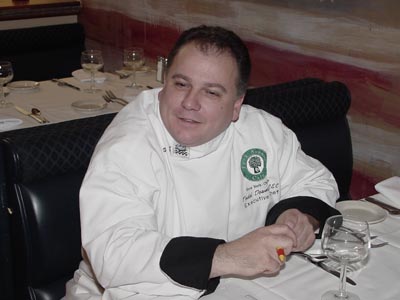 Working with the Pork Council, they asked us to
identify three major food trends in 2000 and beyond. I listed them as an influx
of Latin flavors, everything Australian, and reinterpreted "comfort food" (an
updated version of classical comfort home-based recipes). I really think the
whole Latin influence is a very strong thing. This is largely due to travel.
We vacation there now much more frequently than we ever did. Also, the huge
influx of the Hispanic population to this country. We have more Hispanics here
now that
work in the kitchen. These guys are going to start becoming chefs and running
kitchens. They are going to start cooking recipes from their homeland. Their
food is very visually exciting, orally stimulating to the mouth with very lively
flavors from chilies and spices. I think the American palate is ready for it,
and very much craving it. We witnessed the popularity of hot sauces and things
like that the last few years; it's really become a craze.
Working with the Pork Council, they asked us to
identify three major food trends in 2000 and beyond. I listed them as an influx
of Latin flavors, everything Australian, and reinterpreted "comfort food" (an
updated version of classical comfort home-based recipes). I really think the
whole Latin influence is a very strong thing. This is largely due to travel.
We vacation there now much more frequently than we ever did. Also, the huge
influx of the Hispanic population to this country. We have more Hispanics here
now that
work in the kitchen. These guys are going to start becoming chefs and running
kitchens. They are going to start cooking recipes from their homeland. Their
food is very visually exciting, orally stimulating to the mouth with very lively
flavors from chilies and spices. I think the American palate is ready for it,
and very much craving it. We witnessed the popularity of hot sauces and things
like that the last few years; it's really become a craze.
Australia is really an enigma to me.
Thinking about identifying these trends, I started looking through my book
collection of over 2000 cookbooks, and I had only one book that had anything at
all to say about Australia. However, there is really a culinary revolution
going on down there with very young, forward thinking, creative chefs that are
really doing some phenomenal things with flavor because of the influences of
Thailand, India, and Asian Pacific areas. They are building their own cuisine
down there based on all these different influences; it is very exciting They
have some indigenous ingredients that we don't see here-different kinds of
berries, fruits, and vegetables. I would like to go there to experience it
all.
Al: My impression of Australian cooking is BBQ, and
beyond that it is just kind of voided in my mind. However, you make me think
about whether you could generalize about a country by their food. Can you make
understand a society by what it eats?
Todd: I think to some extent you can. You know, the
French people eat pretty wild things, they eat very daring kinds of foods to most
Americans' minds, and that shows in their lifestyle. They have bravado in their
lifestyle and attitude. You look at England, and their food is very stodgy,
very basic, and that kind of fits with the British persona of a mild-mannered
and quiet. The same thing with Germany. You look at German food, and it is
very straightforward, common, and very peasant like hearty food, and that's
pretty much descriptive of the German character. It's interesting, the
more you look at it.
 Al: You were talking about the three trends of 2000
and beyond, I thought about the three trends in food nutritional values:
calories, fats, and carbohydrates. How has our interest in health and diets
impacted your business? Do people that come to a fine restaurant like Park
Avenue Café care about those issues or are they here to celebrate?
Al: You were talking about the three trends of 2000
and beyond, I thought about the three trends in food nutritional values:
calories, fats, and carbohydrates. How has our interest in health and diets
impacted your business? Do people that come to a fine restaurant like Park
Avenue Café care about those issues or are they here to celebrate?
Todd: I think it's about 50/50. I think many people
like to say that they are watching their figure and watching their health, but
desserts have never been more popular in restaurants. I think in large part
this is due to so many talented pastry chefs out there now. Pastry has really
become an art form. Basically, it is hard to resist when you see something go
through the dining room to another table. In Park Avenue Cafe, our
pastry kitchen is open. People have to sit there throughout the meal and watch
these desserts come up in the window and go by their table. It must be
very enticing to them and make them want dessert. Nevertheless, I think that
we have changed the way we cook professionally. There are much lighter things
on the menu just because people demand that. It has become an unconscious way
of cooking for me. My cooking is just lighter; it's less heavy than it was five
years ago or even two years ago.
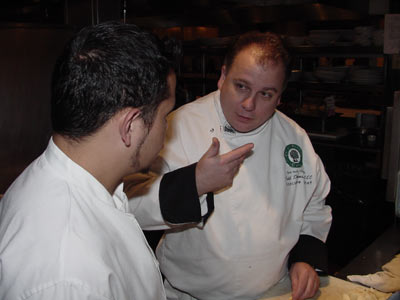 Al: Todd, are there general rules or models that all dishes should possess?
Al: Todd, are there general rules or models that all dishes should possess?
Todd: I think so, at least based on the way I cook
upon the classical foundations. For instance, with
soups, I like to have some sort of a garnish whether it is the addition of an
herb, crouton, or something-even a chip. I like something fried, crispy, diced,
or crunchy to lend another texture and flavor note to the soup whether it's
creamy or broth-based.
Salads: I like to have something crunchy whether
it's crisp like a chip or crunchy like a raw vegetable. Then there should be
something creamy like cheese or something of a soft texture. There also should
something green, tender, and leafy. Then you've the basic building blocks there
that you plug things into.
The same thing is true with entrées. I like to
have something firm, crisp, soft, and tender. For example, you could have
a soft component like mashed potatoes, a firm component like a meat item and something crispy like
a chip or a fried item of some kind just to lend balance to the whole plate. I think that
the crisp texture is very important and is something that I learned indirectly
from David Burke, the chef, who is my boss now. He started that whole craze in
the U.S. with crisp, texture, and crunch components on hot food and most
dishes. It is something they have been doing in France and in Europe for a long
time. It wakes up the mouth a little bit. As you are eating, all of a sudden,
you get something that is crisp and crunchy, and it's like oooooooooo. That's a
different texture as you are eating something. If you are not constantly
stimulated, it becomes old and flat. It is something to think about when you
are building dishes.
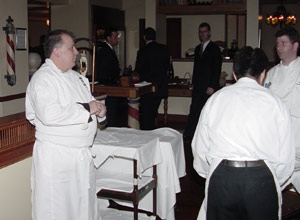 Al: What about my favorite entrée...desserts?
Al: What about my favorite entrée...desserts?
Todd: In desserts, classically I think you need to
have certain components on the plate to make it balanced. You need to have
something creamy, crunchy, something fruit based, or something with acid to
balance the whole plate off. That's pretty much it; those three things are
pretty much constant in most good desserts.
Al: What is the function of wine at a meal?
Todd: I think a large part of what wine contributes
to the experience is acid for the mouth both with digesting the food and
processing the flavors on the tongue. It helps to cleanse the palate and helps
to clear off the other components that may already be in your mouth. If you
have something creamy and rich, a swish of Chardonnay is really good to help
balance it.
 I think wine contributes a lot
also from a communal
standpoint, from a celebratory and heartwarming standpoint. Wine brings "a warm
fire to the table." It brings a communal aspect to eating. It lends a lot to
the meal-just having it on the table. I try to bring character, a lot of sharing and
love. For me, there's also a lot of love in a bottle of wine...somebody has worked
really hard to make that wine what it is-from the people who planted and tended
the grapevines through harvesting,
mixing, and aging it. There is just a lot that goes into it. I think it shows
when you have a nice glass of wine at the table with a good meal, it all just
comes together. You've got the love on the plate and the love in the glass.
I think wine contributes a lot
also from a communal
standpoint, from a celebratory and heartwarming standpoint. Wine brings "a warm
fire to the table." It brings a communal aspect to eating. It lends a lot to
the meal-just having it on the table. I try to bring character, a lot of sharing and
love. For me, there's also a lot of love in a bottle of wine...somebody has worked
really hard to make that wine what it is-from the people who planted and tended
the grapevines through harvesting,
mixing, and aging it. There is just a lot that goes into it. I think it shows
when you have a nice glass of wine at the table with a good meal, it all just
comes together. You've got the love on the plate and the love in the glass.
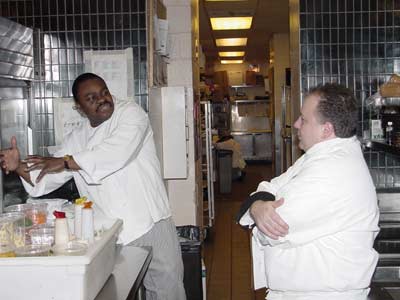 Al: Can you give me a day in the life of a chef?
After this interview, you are going to start your day. What's the day look
like?
Al: Can you give me a day in the life of a chef?
After this interview, you are going to start your day. What's the day look
like?
Todd: The time itself really flies. Before I know
it, I have worked twelve hours. It's just kind of the way it is. It's just a
constant stream of things going on. There's a lot of thinking on your feet,
constant decision-making right and left, phones ringing, dozens of voice mails
and e-mails. It's getting to the point where a large part of the chef's day in
some operations that was based on ordering food, and nowadays you can do a lot of
that online. You can do it as a direct link to your purveyor; I've ordered food
and looked at their entire catalog. It goes one-step beyond sales people in
that, you know, they really waste your time. But online, I was able to place an order
and then instantly see if I was going to be shorted something which is a big
thing for most chefs. When you place an order, you want to get that item the
next day, and a lot of times if you are placing it through a sales person there
can often be days of delay. However, when I am online, I am instantly able to find
out if something is in stock or if not can, I get a substitution? I've got a
purchasing agent at the hotel, so I don't have to worry about of that.
Fortunately, I don't have to deal with any of the ordering trauma, salespeople,
and all that; it's great. It's a huge headache that's lifted off my shoulders.
But most chefs have to worry about it in smaller places. They have to balance
the ordering, scheduling, composition of menus, special things you are going to
do for the day.
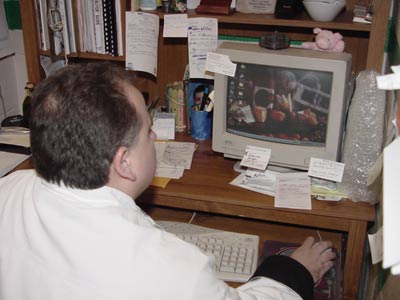
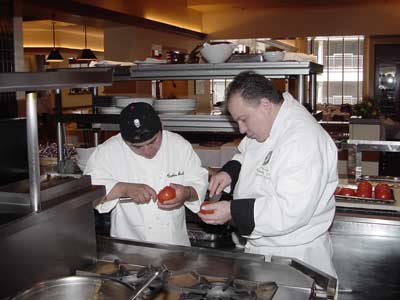
I know that when I start today I am going to have
three lunch parties going on, a couple of all day meetings that have lunches
involved, probably 30-50 people. Downstairs my dining room will just be gearing
up for lunch. We will probably do another 80-100 people for lunch. The weather
being like it is today, the patio will be open. Just the patio being open
attracts people, so it will be busy. I will be getting ready for the evening
shift upstairs in the dining room. Both of my chefs are going to a baseball
game tonight, so I'm watching both restaurants. It's constantly something
like that.
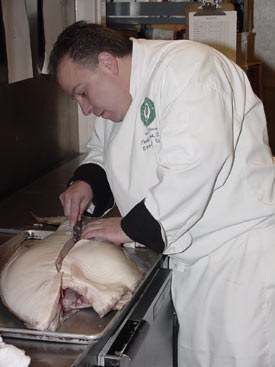 Al: I watched you demonstrate your culinary art with
the Russians several weeks ago. I was struck by the chaos in the kitchen, at
least it seemed like chaos from an outsider's point of view. When I am cooking
at home, I want everybody out. I don't want anybody around me; I don't want any
distractions. However, you just seem to thrive on it.
Al: I watched you demonstrate your culinary art with
the Russians several weeks ago. I was struck by the chaos in the kitchen, at
least it seemed like chaos from an outsider's point of view. When I am cooking
at home, I want everybody out. I don't want anybody around me; I don't want any
distractions. However, you just seem to thrive on it.
Todd: Well, I think I have just gotten used to it. I
have built up a tolerance to it because that's just the way kitchens are. There
is always bustling and somebody is always doing something, walking behind you,
coming around the corner with something hot or something heavy. You get used to
it. However, that was a particularly cramped kitchen, my kitchen is much
bigger than that.
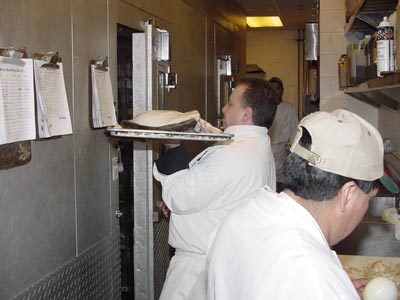 Al: Do you ever do recipes over and over again and
you just think if I have to make this again that you are going to scream?
Al: Do you ever do recipes over and over again and
you just think if I have to make this again that you are going to scream?
Todd: Yes, there's definitely a point where you have
to change things. It is especially true with certain dishes for which you
become known. I'm almost at that point now with this pork shank dish that I
created. It was named Meat Dish of the Year for the whole U.S. a couple
years ago by a very prestigious trade magazine in our industry called
Restaurant News Magazine. It has become my trademark dish and is
featured here at the restaurant. I am almost to the point where if I see
another pork shank go out, I'm just going to scream! But, I had a review on
Friday last week and it was featured prominently in the review. They came and
took pictures of it...so it's like...damn! Now, I will be stuck cooking it for who
knows how much longer!!
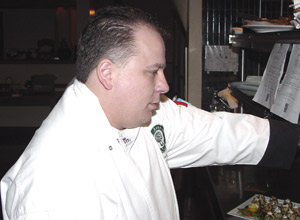 Al: You have talked about comfort food several times
in this interview, and that's a term my wife and I use a lot. What's your spin
of the derivation of that term and what does it mean to you?
Al: You have talked about comfort food several times
in this interview, and that's a term my wife and I use a lot. What's your spin
of the derivation of that term and what does it mean to you?
Todd: I think it is becoming more and more viable
term simply because of the way society is. Some people have never had
homemade mashed potatoes; some of them have never had homemade meatloaf. I came
from a generation where I remember those kinds of food: pot roast, baked chicken
on Sunday night, the meatloaf my mom used to make. It brings back kind of
maternal memories and comforting feelings. It's kind of a "feel good food."
Al: It's related to the feelings you had when you
were a child with food or is there something indigenous to those types of food?
Todd: I think it's just the characteristics-the
simplicity and basic-ness of it. Comfort food is something with which you are
very familiar.
Al: So, in twenty years from now will a Big Mac be
comfort food?
Todd: Probably will be.... Isn't that
scary?!!
Al: Another thing that I want to talk about are your
dreams that are still on the horizon. What are some of your personal or
professional goals that you haven't realized yet?
Todd: I have some tumbling around in my mind; I'm
still kind of polishing them. Definitely, probably for better or worse, I would
like to have my own place-a small place. Ideally, it would be somewhere on the
coast, maybe California. I want to be somewhere like that where I have access
to the fresh food, seafood, and produce. I would like to be in a situation
where I am growing some of my own food. I like to garden and tend the earth and
grow things. That's something that I haven't done for awhile. I also would
like to do something with TV or possibly attain master chef status. For a long
time, it was a driving force to get a gold medal in Germany, which I did in
October 2000. Now that I 've done that, I need to move on to the next
goal.
 Al: You mentioned television. Do you want your own show? What's the draw?
Al: You mentioned television. Do you want your own show? What's the draw?
Todd: It's just kind of something that is lucrative
and has gained a lot of popularity recently. It also garners a lot of respect.
People are really excited about television chefs and meeting them. I seem to
have a knack for it and a natural ability dealing with people. I have done some
work on TV, and it has gone pretty well. I would give it a crack and see what
happens if the opportunity ever arose.
Al: Would you do some one-liners on some famous
chefs?
Todd: I have met most of them, so I definitely have
an insight into them.
Al: What's Graham Kerr's strength?
Todd: Approachability. I think that he also has a
little bit of intrigue. He's got a bit of the European mystique about him. He
also de-mystified food to a large extent the way Julia Child did. He is also
able to make fun of himself and makes fun of cooking in general. He has made
cooking in reach of most people. I really respect his ability to make things
taste good and what he has done for the profession.
Al: Paul Prudhomme?
Todd: He is the master of flavor. He has one of the
most developed and sensitive palates in the world. He is a master of blending
flavors and got all those spice blends that are just incredible. He's kind of
an idol to some extent because he went from very humble means from a very large
family down in the bayou country of New Orleans to being a multi-millionaire.
He was totally self-made. Aside from all of that, I have had the opportunity to
spend some time with him and have gotten some advice from him about marketing products.
I have products that I would like to put on the market, and he was perfectly
fine with spending time with me. He is a very busy guy. I got some very good
insight and good information from him.
 Al: What kind of marketing things are you thinking
about? Al: What kind of marketing things are you thinking
about?
Todd: Sauces and marinades.
Al: After you hang up your apron for the last time,
what do you want written on your epitaph?
Todd: Hmmm...I will have to think about that one....
Maybe, just that he cared...something simple. Something short and sweet, "He
cooked with love." I'd want something that would communicate my love for
nurturing people and making them happy. I would want to get something said
about family also and how much they made my life what it was.
Todd has now started his own restaurant
consulting company, FSInsights and can be reached at
tdowns4206@aol.com
or at 219.928.1640.
Todd and some of his friends.
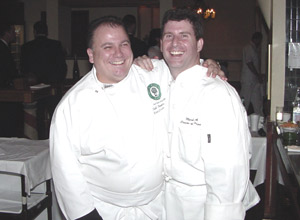

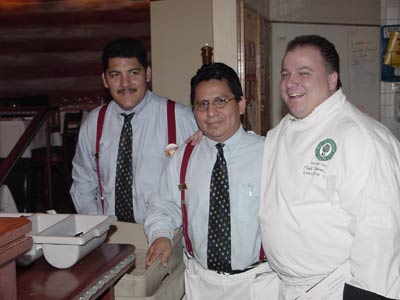
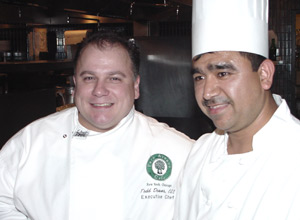
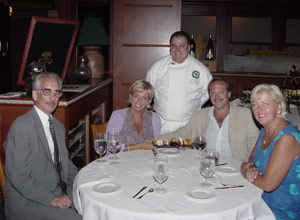

|







 Al: Todd, what I would like you to do is talk to me
about how and why you got into the culinary arts.
Al: Todd, what I would like you to do is talk to me
about how and why you got into the culinary arts. From that point on, I absorbed everything I could
about cooking and food. I didn't have the opportunity to go to culinary school;
I couldn't afford it. I just continued working and fell into another good job
with a really good person, Lois Rothert at a tiny French restaurant in Fort
Wayne called du Jour. She taught me everything from the ground up. I started working in the
cold station doing salads and appetizers, learning how to make pates, things
like that. She had been trained in France. She was instrumental in me doing
things the right way, the classical way. She really laid a good foundation for
me in my future career.
From that point on, I absorbed everything I could
about cooking and food. I didn't have the opportunity to go to culinary school;
I couldn't afford it. I just continued working and fell into another good job
with a really good person, Lois Rothert at a tiny French restaurant in Fort
Wayne called du Jour. She taught me everything from the ground up. I started working in the
cold station doing salads and appetizers, learning how to make pates, things
like that. She had been trained in France. She was instrumental in me doing
things the right way, the classical way. She really laid a good foundation for
me in my future career. Al: Is there a difference between our nations? Are
the French much more sexist and Americans more liberal?
Al: Is there a difference between our nations? Are
the French much more sexist and Americans more liberal? Al: What's it like for your wife to be married to a
chef? Does she cook very often?
Al: What's it like for your wife to be married to a
chef? Does she cook very often? Al: If you hadn't been a chef, what do you think you
would have done?
Al: If you hadn't been a chef, what do you think you
would have done? Al: Do you have a list of places where you would like to go to further you education?
Al: Do you have a list of places where you would like to go to further you education?
 Al: When you are traveling, can you eat something and
replicate a recipe by merely tasting it?
Al: When you are traveling, can you eat something and
replicate a recipe by merely tasting it? Al: A couple weeks ago, I observed you doing a training
session for some Russian chefs that was put on by
National Pork Producers Council. It was obvious that creativity and culinary
interests broke down all sorts of barriers.
Al: A couple weeks ago, I observed you doing a training
session for some Russian chefs that was put on by
National Pork Producers Council. It was obvious that creativity and culinary
interests broke down all sorts of barriers. Working with the Pork Council, they asked us to
identify three major food trends in 2000 and beyond. I listed them as an influx
of Latin flavors, everything Australian, and reinterpreted "comfort food" (an
updated version of classical comfort home-based recipes). I really think the
whole Latin influence is a very strong thing. This is largely due to travel.
We vacation there now much more frequently than we ever did. Also, the huge
influx of the Hispanic population to this country. We have more Hispanics here
now that
work in the kitchen. These guys are going to start becoming chefs and running
kitchens. They are going to start cooking recipes from their homeland. Their
food is very visually exciting, orally stimulating to the mouth with very lively
flavors from chilies and spices. I think the American palate is ready for it,
and very much craving it. We witnessed the popularity of hot sauces and things
like that the last few years; it's really become a craze.
Working with the Pork Council, they asked us to
identify three major food trends in 2000 and beyond. I listed them as an influx
of Latin flavors, everything Australian, and reinterpreted "comfort food" (an
updated version of classical comfort home-based recipes). I really think the
whole Latin influence is a very strong thing. This is largely due to travel.
We vacation there now much more frequently than we ever did. Also, the huge
influx of the Hispanic population to this country. We have more Hispanics here
now that
work in the kitchen. These guys are going to start becoming chefs and running
kitchens. They are going to start cooking recipes from their homeland. Their
food is very visually exciting, orally stimulating to the mouth with very lively
flavors from chilies and spices. I think the American palate is ready for it,
and very much craving it. We witnessed the popularity of hot sauces and things
like that the last few years; it's really become a craze.  Al: You were talking about the three trends of 2000
and beyond, I thought about the three trends in food nutritional values:
calories, fats, and carbohydrates. How has our interest in health and diets
impacted your business? Do people that come to a fine restaurant like Park
Avenue Café care about those issues or are they here to celebrate?
Al: You were talking about the three trends of 2000
and beyond, I thought about the three trends in food nutritional values:
calories, fats, and carbohydrates. How has our interest in health and diets
impacted your business? Do people that come to a fine restaurant like Park
Avenue Café care about those issues or are they here to celebrate? Al: Todd, are there general rules or models that all dishes should possess?
Al: Todd, are there general rules or models that all dishes should possess?
 Al: What about my favorite entrée...desserts?
Al: What about my favorite entrée...desserts? I think wine contributes a lot
also from a communal
standpoint, from a celebratory and heartwarming standpoint. Wine brings "a warm
fire to the table." It brings a communal aspect to eating. It lends a lot to
the meal-just having it on the table. I try to bring character, a lot of sharing and
love. For me, there's also a lot of love in a bottle of wine...somebody has worked
really hard to make that wine what it is-from the people who planted and tended
the grapevines through harvesting,
mixing, and aging it. There is just a lot that goes into it. I think it shows
when you have a nice glass of wine at the table with a good meal, it all just
comes together. You've got the love on the plate and the love in the glass.
I think wine contributes a lot
also from a communal
standpoint, from a celebratory and heartwarming standpoint. Wine brings "a warm
fire to the table." It brings a communal aspect to eating. It lends a lot to
the meal-just having it on the table. I try to bring character, a lot of sharing and
love. For me, there's also a lot of love in a bottle of wine...somebody has worked
really hard to make that wine what it is-from the people who planted and tended
the grapevines through harvesting,
mixing, and aging it. There is just a lot that goes into it. I think it shows
when you have a nice glass of wine at the table with a good meal, it all just
comes together. You've got the love on the plate and the love in the glass. Al: Can you give me a day in the life of a chef?
After this interview, you are going to start your day. What's the day look
like?
Al: Can you give me a day in the life of a chef?
After this interview, you are going to start your day. What's the day look
like?

 Al: I watched you demonstrate your culinary art with
the Russians several weeks ago. I was struck by the chaos in the kitchen, at
least it seemed like chaos from an outsider's point of view. When I am cooking
at home, I want everybody out. I don't want anybody around me; I don't want any
distractions. However, you just seem to thrive on it.
Al: I watched you demonstrate your culinary art with
the Russians several weeks ago. I was struck by the chaos in the kitchen, at
least it seemed like chaos from an outsider's point of view. When I am cooking
at home, I want everybody out. I don't want anybody around me; I don't want any
distractions. However, you just seem to thrive on it.  Al: Do you ever do recipes over and over again and
you just think if I have to make this again that you are going to scream?
Al: Do you ever do recipes over and over again and
you just think if I have to make this again that you are going to scream? Al: You have talked about comfort food several times
in this interview, and that's a term my wife and I use a lot. What's your spin
of the derivation of that term and what does it mean to you?
Al: You have talked about comfort food several times
in this interview, and that's a term my wife and I use a lot. What's your spin
of the derivation of that term and what does it mean to you?  Al: You mentioned television. Do you want your own show? What's the draw?
Al: You mentioned television. Do you want your own show? What's the draw? Al: What kind of marketing things are you thinking
about?
Al: What kind of marketing things are you thinking
about?




